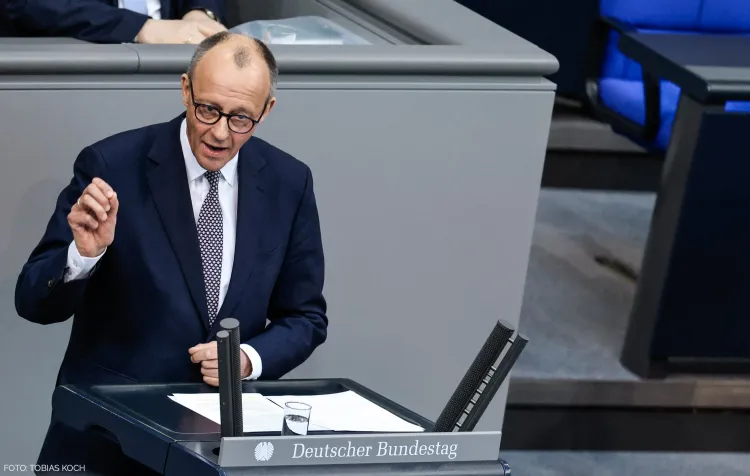Did Friedrich Merz Become the New German Chancellor?

Synopsis
Key Takeaways
- Friedrich Merz elected as German Chancellor.
- First Chancellor candidate to fail in the first round since WWII.
- Merz aims for economic growth over two percent.
- Strong stance on immigration and foreign policy.
- Leadership may indicate a shift towards conservative policies.
Berlin, May 6 (NationPress) Friedrich Merz from the Christian Democratic Union (CDU) was elected as German Chancellor during the second-round voting in the Bundestag on Tuesday afternoon. In the initial round, Merz was unable to achieve the necessary majority in parliament.
A total of 325 members of Germany's Bundestag, the lower house of parliament, voted in favor of Merz, exceeding the 316 seats required for election. In the first round earlier that day, he received 310 votes. Notably, he is the first Chancellor candidate since World War II to not be elected in the first round.
After the first round's failure, Bundestag President Julia Kloeckner suspended the session, prompting extensive discussions among parliamentary groups before the second round of voting was arranged.
Upon the election results, Merz proceeded to the official residence of the Federal President, Schloss Bellevue, for his formal appointment by President Frank-Walter Steinmeier.
Merz will officially take on the role of federal Chancellor, leading the new government formed by the Union bloc (CDU/CSU) and the Social Democratic Party (SPD).
Born in 1955 in North Rhine-Westphalia, Germany, Merz pursued a law degree and served as a judge at the district court in Saarbrucken, the capital of Saarland, from 1985 to 1986.
He was a member of the European Parliament from 1989 to 1994 and served in the German Bundestag from 1994 to 2009. Additionally, he led the CDU/CSU parliamentary group from 2000 to 2002.
After a hiatus from active politics in 2009, Merz announced his return in 2018, following then Chancellor Angela Merkel's decision against re-election, according to Xinhua news agency. He subsequently became the chairman of the CDU and the leader of the CDU/CSU parliamentary group.
Beyond his political career, Merz has worked with an international law firm, chaired the 'Atlantic Bridge' association promoting German-American cooperation, and held various roles in the business sector.
His strong connections with the business community have established him as a pro-business figure within the CDU, promising to rejuvenate the German economy with a target of over two percent annual growth.
Merz advocates for a firmer approach to immigration, while on the foreign policy front, he seeks to lessen Europe’s dependency on the United States and restore Germany's international reputation.
Analysts suggest that Merz is likely to pursue a more conservative political agenda.









